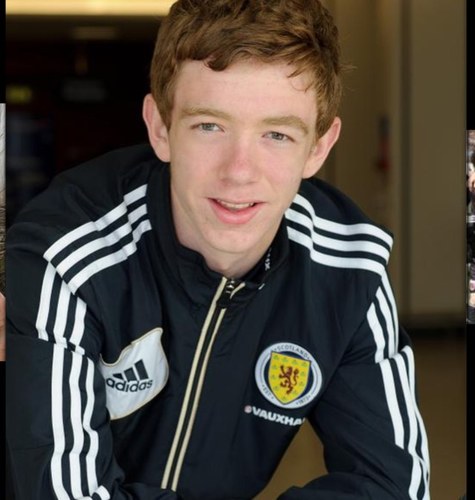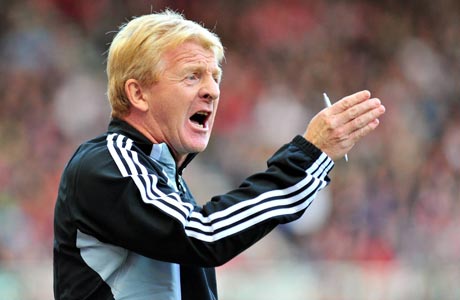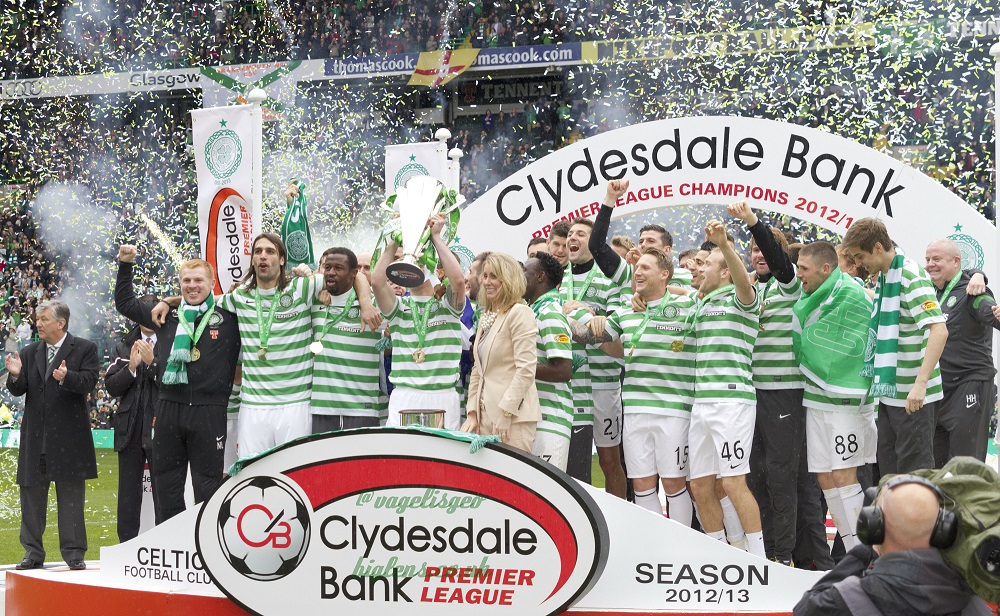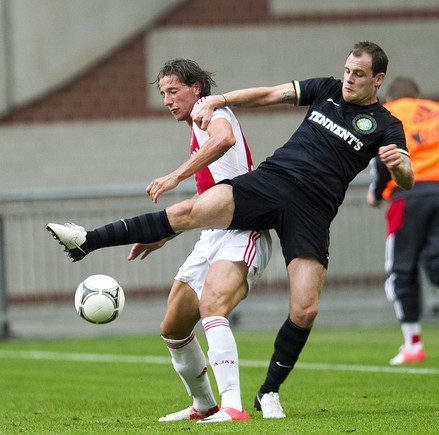With the youngsters already having won all three of their Clydesdale Bank U20 league games (a league Rangers declined to participate in) the signs are encouraging for the season ahead that others may break into the first team. Denny Johnstone scored a goal at Fir Park which would grace any game see it here:
I’ve been told to get to Firhill for these league games as a young squad are playing some excellent football.
The group for 2012/13 NextGen has kicked off and Sporting Lisbon already look the favourites with a comfortable win at Aston Villa. The match report included the following:
“This was an excellent game of football between two teams looking to play the right way. Both sets of players looked comfortable in possession and will have undoubtedly benefitted from a fixture of this quality. We very much look forward to the next game in this group which sees Villa travel to play PSV in Eindhoven and Sporting travel to Glasgow to play Celtic.”
Group 4
|
Team |
P |
W |
L |
D |
F |
A |
GD |
PTS |
|
Sporting Clube de Portugal |
1 |
1 |
0 |
0 |
3 |
1 |
2 |
3 |
|
PSV Eindhoven |
1 |
1 |
0 |
0 |
1 |
0 |
1 |
3 |
|
Celtic |
0 |
0 |
0 |
0 |
0 |
0 |
0 |
0 |
|
Aston Villa |
2 |
0 |
2 |
0 |
1 |
4 |
-3 |
0 |
Sporting Lisbon is reckoned to be one of the top academies in the world focusing on technical ability before physical ability. Whilst we continue to pick the biggest boy in the playground we will continue to fall further behind.
Interesting article below:
For a club of its small size, Sporting Lisbon has produced a remarkable amount of talent including arguably the world’s greatest player Cristiano Ronaldo. Here’s how they do it…
It is not surprising that so many young stars have come through the ranks at Sporting Lisbon or that Manchester United chose Sporting as its development partner in Portugal -the two clubs have an agreement to send youth players and coaches to each other for experience and United, whose assistant manager Carlos Queiroz knows the club so well as a former Sporting coach, signed Ronaldo and Nani from there.
Former Sporting, Porto, Aston Villa and Portuguese international defender Fernando Nelson explained the reason for the club’s success. “Sporting depend on youngsters. They are a source of income. Obviously, they try to give the best conditions to youngsters and they also pay them more money than other clubs.
“They are trying to do something similar to Ajax. They bring top youngsters through and they are a big source of money. In future they will try not to sell all their young stars, but balance it out by selling one youngster and buying good players to win trophies.
“But they had to sell players like Ronaldo and Nani because the money offered was too high. They got a lot of money for them. With that they can rebuild the future of the club straight away. They tend to find new youngsters to come through.”
Nelson explained how the club goes about recruiting its youngsters from far and wide. “Simao moved from far away to play for Sporting at the age of 11. Sporting later sold him to Barcelona for £14 million. It gives an idea of the complexity and professionalism of the set-up. They try to find their players really young. They have scouts all round the country looking for them, even in Madeira where they found Cristiano Ronaldo.
“They have the best school for youngsters, far better than any other team in Portugal. In fact, I don’t know if any team in Europe has the same conditions.”
Stuttgart’s Portuguese international defender Fernando Meira, formerly of Benfica, admitted: “Sporting put more into youth development than other clubs. The players go straight from school to the team. Of course Sporting get the benefit from that.”
The development programme was stepped up six years ago with the move to a new state of the art training ground at Alcochete with its “Academia de Futebol de Sporting”. Located on the southern outskirts of Lisbon, near the River Tagus, it is considered the best in the country.
Pedro Mil-Homems, director of the academy, says: “Sporting has an important tradition in Portugal as a club which forms youngsters. In 2002 we opened the new academy to enable us to work with better conditions.
“The reasons for the success are, firstly, a good policy, getting youngsters when they are young and seem like they have a talent for football. Secondly, there is the technical structure, using coaches who have shown their ability to form players and bring them through.
“Players learn the benefits of teamwork and are given the chance to play, coming through the ‘B’ team and then the first team, so they can show what they can do, as was the case with players such as Ronaldo, Quaresma and Nani and Viana. They all went through the ranks to join the first team.”
There was the academy at Ajax which introduced a series of major talents into Dutch football and launched them on the world stage. Then there was France with its academy which also produced a team of players who went on to win the World Cup and European Championship. But now Portugal is the country attracting more and more attention.
There is a resurgence of top young international standard players already coming through which can replace the “Golden Generation” of players who twice won the Under ’20 World Cup under Carlos Queiroz in 1989 and 1991 and who included the likes of Luis Figo, Rui Costa, Joao Pinto and Fernando Couto.
There is a resurgence of top young international standard players already coming through which can replace the “Golden Generation” of players who twice won the Under ’20 World Cup under Carlos Queiroz in 1989 and 1991
Meira, 29, explained why it is that a relatively small country is so successful in producing gifted youngsters: “In Portugal we love football. I think the dream of all Portuguese youngsters is to become a professional footballer.
“As Portugal doesn’t have the financial means to sign players, they have to develop local players, so there are great talents, including those who come through Sporting’s academy.
“Portugal has great players at youth level. Portugal have regularly won tournaments at under ’17 and under ’19 level and have won under ’20 World Cups. It’s just a shame that the national team hasn’t gone further.
“If Portugal has great players, it doesn’t mean they naturally are more gifted than in other countries, but they have more chances to develop at youth level. Ronaldo, like Quaresma and others, are players it was known that sooner or later would go on to play for big European clubs. They are part of a series. It’s important that their clubs give them a chance to play and to grow. Ronaldo, despite being still young when he signed for United, has gained a lot of experience and is a player who makes a difference.”
Former Portugal and Benfica legend Eusebio said: “It is good for our country if our players go to big European clubs because they get experience and it brings prestige to Portugal if they become big names abroad.” It is also good for Sporting, as it helps them to keep their debts under control.
Former Sporting (and Benfica) coach Fernando Santos recalls: “I was very reluctant to let Ronaldo and Quaresma go, but could not prevent it. The problem was that they played too well and caught the attention. But we did not need to bring players from outside to replace them. I needed another two players to replace them, but it did not mean they had to come from outside. We already had players who could replace them.”
The methods
The training ground at Alcochete has seven pitches, of which five are grass, and two
are synthetic of which one is covered. There are two gyms, a sauna and a hydrotherapy tank, no swimming pool, but there is a plan to build a pool in the future.
For youngsters there is one training session a day, in the afternoon at 16.30 or 18.00 pm, each lasting about one hour and timed to avoid the heat of the middle of the day. As most matches are played in the evening, they do not need to acclimatise to playing in the heat. They train twice a week in the evening and four times a week in the afternoon. The 11 to under 17-year-olds usually train six hours a week and increase this to nine hours a week at the age of 17 and to 12 hours between 17 and 19. They also play matches in official junior and youth leagues for Sporting.
At Sporting ball skills are particularly emphasised, especially from the earliest age. Touch and passing are practised repeatedly before entering into further skills such as shooting, free kicks, heading, tackling, etc. Mini matches are frequently played on reduced pitches in order to improve close ball skills. By the time players reach the age of 13, they will all be comfortable on the ball and have basic ball skills well mastered.
The physical side of things is given separate treatment, increasingly from the age of 15 upwards. There is the usual running round the track and jumping hurdles. But If any particular defects are spotted even during training matches, players will be asked to leave the general training session half an hour early and go and spend three quarters of an hour in the gym, accompanied by youthfitness coach Carlos Bruno. There they have to work on strengthening such aspects as upper thigh muscles, but also chest and even arms for good all-round strength. These receive more and more attention as the players get older.
There are also more light-hearted sessions. For example, they will play matches in which you can score with any part of your body, be it the hands, feet, chest or head. Or playing “piggy in the middle”, but with a difference. The man in the middle stands while those around him sit down and use any part of their body to pass the ball to each other. This is designed to maintain players’ sheer joy of playing, but in a competitive environment.
The best young players who progress to the ‘B’ team can join in certain training sessions with the first teamers in order to learn from playing with them, and this is usually extended to pre-season tours. It also gives the head coach a chance to see just how well those youngsters are progressing.
The best young players who progress to the ‘B’ team can join in certain training sessions with the first teamers in order to learn from playing with them, and this is usually extended to pre-season tours.
Players who are brought in from distant places are mostly put in lodgings in the training complex. There they can adjust more quickly to life at the club and are well looked after in order to avoid home sickness. They are strongly encouraged to do well at school.
Sporting youth co-ordinator Jean Paul Castro says: “We believe that school makes a great mental contribution which is fundamental for learning football. If they have a good level at school it helps them understand football. Cristiano Ronaldo wasn’t a brilliant student, it’s true, but he was an exception because he had an enormous natural talent for football.”
He added: “We give our players a football culture. We analyse the trends in modern football and adapt our play to that reality. In modern football there is little space to play in, so you need not only the ball skills but also an understanding of the game with good anticipation and the ability to play as a team.
“In modern football there are quick transitions. When you get the ball back you have to switch play quickly to attack. You have to be able to change quickly between defence and attack.
“We also practice different situations that can occur in a real game. One v one, one v two, two v one, two v two, three v two, three v one, three v three, etc.”
He added: “Until the age of 15 the training is mainly technical. Players must have a good relationship with the ball and must have learned all the basics. After fifteen the physical side gets greater importance. We use machines for muscles. We work on resistance and speed, especially resistance. Speed is a determining factor in football, including speed of reaction, but it’s a physical quality which players evolve.”
Nutrition: Head of the medical department Gomes Pereira prescribes the diets for the players. But this is less significant than one might expect because the Portuguese diet is already considered very healthy, being based on fish, chicken and vegetables, and therefore does not need a great deal of adjustment. The senior players often go out to restaurants together. There are no heavy restrictions in terms of what players can eat. Alcohol is also permitted for senior players who may take some wine with their meals, otherwise it is usually water.
All coaches must have a solid foundation. Some are recruited from outside. Some continue their formation within the club. Jean Paul, for example, is qualified in physical education with specialisation in football. The scouting department is co-ordinated by Paulo Cardoso who attended the African Cup of Nations, as Sporting like to spread their tentacles far and wide.





